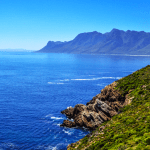There’s a new species of wildlife expected to descend in South Africa in their thousands this summer. And it’s set to make headline news. Yes, it’s the football fan.
South Africa as a destination is pulling out all the stops before taking centre stage this June to host the 2010 World Cup. But don’t be put off by the thought that South Africa in 2010 is just about football and marauding fans. It isn’t. For non-World Cup travellers there is so much to experience in Cape Town that doesn’t involve football, from soaking up the city’s colourful culture to inexpensive shopping opportunities. There’s also fine dining in fabulous restaurants for a fraction of the price you’d pay in the UK and vineyards where wine tasting is out of this world.
It is possible to get around the city using local transport but to explore the stunning coastline hiring a car is a must. Visit cometocapetown.com/car-hire for more info and rates.
But don’t arrive without doing some research. You should pick up the latest edition of the Lonely Planet city guide to Cape Town (lonelyplanet.com), it’s packed with fascinating information. As well as the usual recommendations of what to do, see and stay in the city, the brief historical summary to the Cape’s colourful history is essential to know before you go.
Most people visit South Africa to see the wildlife but I wasn’t here to see the so-called Big Five — that’s the lion, leopard, elephant, rhino and buffalo — because Cape Town offers its own urban safari. Come here to get up close with the great white shark, African penguins (once known as the Jackass penguins, so-called because of their donkey-like bray), baboons, dassies (like an overgrown guinea pig) and the Cape Fur seals which can even be spotted languishing in the waters which lap the V&A Waterfront shopping centre.
Take the great white shark — endangered in many parts of the world, but with numbers thriving in the waters surrounding Cape Town. Proof of their presence can be seen by the shark warning signs posted around the city’s beaches, while shark spotters sit posted on the cliff tops. That aside, it’s one of the few places in the world where you see these mighty creatures breach – that’s jump out of the water – and also where you can cage dive, which is the closest you can get to Jaws without getting munched (and live to tell the tale).
Baboons can be spotted roaming the roadside in some areas, while penguins have formed their own colonies along the coastline. The most accessible penguin habitats are those to be found at Boulders Beach and Betty’s Bay and cost around £1 to visit. Wildlife aside, there is no escaping South Africa’s chequered past, and neither should it be ignored. Apartheid (the segregation between blacks and whites) ended 20 years ago but change is taking longer than anticipated. The prevalence of black-inhabited townships surrounding the city, for me, made uneasy travelling, but according to most of the locals times are changing for the better.
For the visitor there are also plenty of opportunities to support local townships. Many restaurants support the StreetSmart scheme (www.streetsmartsa.org.za), whereby an additional five rand can be added to a restaurant bill. All funds go directly to helping local street children. It’s also well worth joining a township tour to see the positive impact of change, as well as to enjoy the opportunity to buy locally made goods.
Thanks to my Lonely Planet Guide, I booked a tour to visit Khayelitsha, the largest township just half an hour outside Cape Town. And for those looking for the ultimate township accommodation experience check into what is billed to be South Africa’s smallest B&B, where the owner Khuthazwa Vicky Balman offers a real insider’s guide into life here.
But don’t forget Cape Town’s most popular sights — from the iconic Table Mountain nature reserve (take the cable car to the top) to Robben Island, Nelson Mandela’s former prison abode, reached by ferry. While Cape Point, also known as the Cape of Good Hope, lies in a stunning national park and is home to yet more wildlife and breathtaking views. And that’s just for starters. Now what’s all this about the football?
source: Belfast Telegraph



